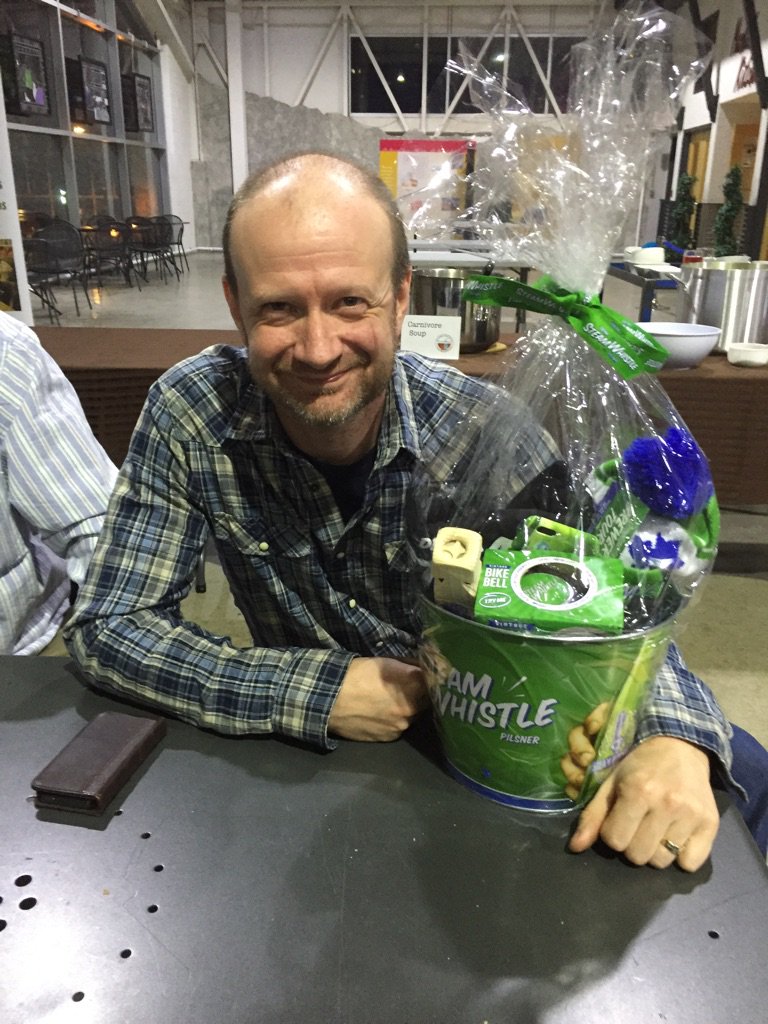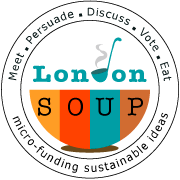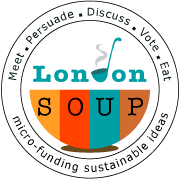A warm and welcoming audience attended our 4th sustainable ideas microfunder on Sunday, January 31 at Covent Garden Market in downtown London. It was another successful event and feedback was again positive and supportive.
We thank everyone for attending and your continued support. We are grateful for the help of our SOUPstirs, and Congregation of the Sisters of St. Joseph, City of London and our assisting partners, Cooking Matters, Steam Whistle Brewing, Fanshawe College and LIFE*SPIN.
Best Idea as Voted

Ryan Hunt of The Maker Bus with One Microscope Per Child was voted by audience spoons as having the best idea and walked away with the night’s $1,000 micro grant. The audience felt it was a unique, innovative concept and best exemplified the virtues of sustainability.
Ideas Pitched
Presenters (in order) for our most recent sustainable ideas micro-funder:
#1/ The Soulcraftroundtable – presented by David J. Glen
Site: www.glenfarmsgourmet.com
Describe your concept
Our goal is to create a coaching and teaching center that integrates the less fortunate who are on fixed incomes and need some part time work in order to gain a better life for themselves, with start-We want to do that by creating a shared space kitchen for start-ups. An approved kitchen that will give opportunities to try out new ideas, new technologies and new products, to decide if there really is a business to be made from them, businesses that need part time workers to get their ideas off the ground.
Why does this idea matter to you and to the London-Middlesex community?
London is in the Heart of Ontario’s food belt. We have cooks graduating from Fanshawe College and Technology grads coming from Western University and we want to connect them with seasoned entrepreneurs.
How will you use this grant funding to realize your project?
The money will be used to incorporate so that we can then seek Equipment sponsors, Media sponsors, Location sponsors. Also used to pay for hosting monthly meetings. Also purchasing equipment.
Launch a dedicated Soulcraftroundtable website. Right now it is a page on http://www.glenfarmsgourmet.com
What is the timeline for your project?
I am operating out of the New London Food Incubator 630 Dundas Street. We expect to be open in 30 days and would hope to have our first meeting in 60 days.
What specific elements of sustainability are being addressed in your project?
This Not for Profit would be a feeder system (Farm Team) that would be a first step to growing a business at the Farmers Market or The London Food incubator.
#2/ Lightcycle – presented by Margaret Gray
Describe your concept
My business is Lightcycle, an upcycled art lighting business, offering repurposed and recycled lighting for both residential and commercial purposes.
Lightcycle use’s a selection of hand picked materials, combining antiques, reclaimed treasures, archaic and unusual items to create beautiful, handcrafted and unique luxury lighting products. All of our wonderful creations come from items that would otherwise go to our landfills. All design work is driven by the available materials, ensuring everything is one of a kind.
Lightcycle will offer hand crafted, locally made and environmentally sustainable lighting choices to the growing trend of the socially conscious that prefer to have something that is not “big box” or made in a far off land.
Lightcycle will have the assured safety quality of the Canadian Safety Association certification on all of its lighting, providing safety to the consumer, as well as the ability to sell directly to stores in London and area.
Why does this idea matter to you and to the London-Middlesex community?
Lightcycles’ whole concept should matter to Londoners, as most of the lighting purchased in London does not support the local economy. At Lightcycle we offer affordable, unique lighting that is locally made and environmentally sustainable.
Lightcycle is part of a growing niche of small businesses that are creating employment, using our unlimited supply of post-consumer waste and helping to rebuild our economy!
How will you use this grant funding to realize your project?
The funding will be used to attain CSA certification for two certification sessions. The cost of a two-hour session from UL is $500, plus expenses. It is most cost efficient to have a minimum of 15 lights finished for each session. This will allow for sales to start, enabling cash flow positive to begin.
What is the timeline for your project?
Lightcycle has a goal of February for certification of 15 units.
What specific elements of sustainability are being addressed in your project?
Lightcycle is a socially conscious company offering an economical product that is environmentally sensitive. Not only are the products built using the three R’s, the workshop is comprised of recycled wood, peg board, containers and dressers. As well, very little waste is pro duced from production. A very GREEN company in all respects!
#3/ One Microscope Per Child – presented by Ryan Hunt
Site: The Maker Bus
Describe your concept
You can only see so much of the natural world through your eyes alone. One Microscope Per Child is a sustainable social enterprise that will allow child and youth in the Thames Valley Region to explore the world on a microscopic level.
Using 3D printing technology and inexpensive glass beads, One Microscope Per Child will create durable microscope attachments that can instantly transform any smart phone or tablet into a working microscope, capable of magnifying samples up to 1000 times normal vision.
The goal of One Microscope Per Child is to give children and youth in our community a deeper appreciation of the natural world. We are surrounded by entire worlds of natural life and these hand-held microscopes will empower children and youth to explore these worlds.
Each microscope clip will cost approximately $2 to produce. These clips will be sold for $10 to the public. With each $10 clip sold, 5 additional clips will be printed and donated to schools in the Thames Valley Region. By selling only 3 clips to the public, we can provide an entire class with One Microscope Per Child.
With these microscopes in hand, we hope to inspire new generations of environmental scientists, nature advocates, and engaged, connected citizens.
Why does this idea matter to you and to the London-Middlesex community?
Childhood experiences last a lifetime. If we inspire children and youth to make meaningful connections with the environment today, they will be more likely to maintain a connection with the environment as adults.
Natural heritage sites like the Forks of the Thames and Westminster Ponds are teeming with microscopic life that is absolutely essential to functioning of our ecosystem. With these microscope clips in hand, One Microscope Per Child hopes to empower our community’s youth to become citizen ecologists who appreciate even the most minute elements of our natural world.
How will you use this grant funding to realize your project?
I will use the $1000 grant to purchase a higher resolution 3D printer. While the current 3D printer I have access to have allowed me to create working prototypes of the microscope clips, these prototypes are crude compared to what a more expensive 3D printer could produce.
A more expensive 3D printer will allow me to print more clips at one time and print clips of a higher quality. All clips will be printed using sustainable, compostable bio-plastics.
What is the timeline for your project?
With a higher resolution 3D printer, I can start producing the microscope clips and selling them to the public by May 2016, with deliveries of classroom clip sets available by September 2016.
As a Co-founder of the MakerBus and the Education Coordinator for the London Heritage Council, I interact with hundreds of teachers and educators in our community. I will leverage these community connections to help promote and market the One Microscope Per Child concept within the Thames Valley Region.
What specific elements of sustainability are being addressed in your project?
These microscopes will allow children to better understand their natural environment. Moreover, by distributing these microscope clips to schools, we ensure an equitable distribution of these education resources within our community.
With these microscopes in hand, we hope to empower children and youth to become citizen scientists who explore and appreciate the natural world. Education is an essential part of sustainability, and One Microscope Per Child hopes to make environmental education more innovative, fun, and accessible.
#4/ Innovative Growing Mediums for Increased Crop Yield – presented by Thomas Butler
Describe your concept
There is a desire by the horticulture industry to replace peat, rock wool and imported cocoa fiber with substrates that better promote root growth and release nutrients to roots. The concept of this project is to develop formulations of biochar and compost that will be competitive with rock wool substrate in costs but the products will outperform rock wool in that it will enhance crop productivity and have a greater longevity of use. The project aims to enhance the physical and biological factors of the growing medium including removal of phytotoxic compounds, elimination of high rates of sodium, improved aeration, water percolation, and structure longevity, better ion exchange and buffering capacity, etc. The final product will be manufactured in various forms including blocks and lose medium. The formulations will guarantee that the grow medium products will meet the growers’ standards. For the greenhouse industry it will offer the potential of becoming organic producers and significant potential yield increases.
This project will focus first on the greenhouse market as the short crop cycles and controlled conditions allow for results to be demonstrated without the liability and long term study that is required for soil amendment trials. If the result is positive the research can be applied across the industry.
Why does this idea matter to you and to the London-Middlesex community?
Small scale, part time food businesses need a safe place to grow. We don’t want developing food businesses hiding in basements and garages.
How will you use this grant funding to realize your project?
The grant funding will go towards improving and automating my plant growth research station. To increase the validity and repeat-ability of the research I need to purchase the following:
Ph monitoring instrumentation | Nutrient solution | Nutrient Solution Pumps | Growing medium
What is the timeline for your project?
6-8 months
What specific elements of sustainability are being addressed in your project?
Increase crop yield -Reduced energy consumption for food production -Reduced food waste -Increased product lifespan -Increase nutritional value of crops -Reduce water consumption -Reduce leachate -Increase landfill diversion.
The Sustainable #Spiffybowl
We are grateful to Steam Whistle Brewing for donating a gift pack (but no beer) of a variety of accessories, including an actual whistle which we used for presentation timing.
Steam Whistle has provided gift packs since LondonSOUP inception and we are proud of that continued association.
Richard DeJonge was the LondonSOUP 4 winner of the @SteamWhistle #sustainability #Spiffybowl.
 About LondonSOUP
About LondonSOUP
LondonSOUP is a not-for-profit entity run entirely by volunteers with all collected and donated funds paying for presenter micro-grant, food supplies and venue.
We are grateful to Congregation of the Sisters of St. Joseph and City of London for providing financial support of this event and would also like to acknowledge our assisting partners, Cooking Matters, Steam Whistle Brewing, Fanshawe College and LIFE*SPIN.
LondonSOUP is part of the worldwide Sunday Soup organization, shares a similar concept with Detroit Soup , and have ongoing relationships with Calgary Soup, Soup Ottawa, TechPort Soup and Soup London, our sister group in the UK. We have local relationships with the Middlesex London food assessment team, and London Environmental Network (LEN), to name only a few.




You must be logged in to post a comment.